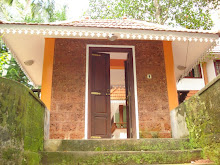
I had heard a lot about this black and white Ritwik Ghatak classic from my PG days. I was particularly enamoured after watching a few clippings. So I thought I'll start off the New Year with a good movie--Meghe Dhaka Tara--and good old Old Monks.
A hauntingly beautiful Neeta (Supriya Choudhury) is virtually the sole bread-winner of a lower middle-class family, with an almost senile but seemingly well-educated father and a frustrated mother. Of the four children -- herslef being the second--the eldest is a talented and eccentric but jobless singer and particularly close to the loving and self-sacrificing Neeta.
Stressed out by chronic poverty, physical duress, a round-the-clock swearing mother, indifferent younger siblings and an imbecile lover, who gives her up for her more chirpy and sensual younger sister Geeta, Neeta's character often shows glimpses of the Orwellian 'Boxer'. Soon she falls prey to TB and ostracises herself into a separate room.
Her singer brother, who meanwhile leaves the houshold, fed up of the ignominy of being reduced to a nobody in the family and unable to bear Neeta's abuse, manages to make name and money in distant Bombay. By the time he returns as a successful artiste, Neeta is almost on the verge of collapsing. Heartbroken, he puts her in a sanatorium in Shillong--where the famous and heartwrenching "Dada, Ami Baachte Chai" (brother, I want to live!) scene is played out in all its agony to end the drama.
The story as such is nothing great, especially for us Malayalees, who are fed on a regular diet of pathos-filled drama like "Thulabharam", "Bharya" and other such flicks of yore. But what does strike the viewer is the stunning camera work that makes use of shades, shadows and sparkles to the hilt, the sensitive performances of almost all main actors, and use of music--prdomnantrly Hindustani--to emphasise the nuances.
The story as such is nothing great, especially for us Malayalees, who are fed on a regular diet of pathos-filled drama like "Thulabharam", "Bharya" and other such flicks of yore. But what does strike the viewer is the stunning camera work that makes use of shades, shadows and sparkles to the hilt, the sensitive performances of almost all main actors, and use of music--prdomnantrly Hindustani--to emphasise the nuances.
The story as such is nothing great, especially for us Malayalees, who are fed on a regular diet of pathos-filled drama like "Thulabharam", "Bharya" and other such flicks of yore. But what does strike the viewer is the stunning camera work that makes use of shades, shadows and sparkles to the hilt, the sensitive performances of almost all main actors, and use of music--prdomnantrly Hindustani--to emphasise the nuances.
In this regard, one aspect to be particularly noted is the childhood dream of Neeta to climb a beautiful hill along with her elder brother to witness the sunsrise from there. The hill being symbolic--from what I percieved--of success (for her brother) and escape from penury and struggle (for herself). But as fate would have it, finally when she does get to climb a scenic hill, on which the sanatorium is located, she loses the battle for life.
In this regard, one aspect to be particularly noted is the childhood dream of Neeta to climb a beautiful hill along with her elder brother to witness the sunsrise from there. The hill being symbolic--from what I percieved--of success (for her brother) and escape from penury and struggle (for herself). But as fate would have it, finally when she does get to climb a scenic hill, on which the sanatorium is located, she loses the battle for life.
The hill, which she climbs with her brother's help, ends being only the fulfilment of her dream for her brother, while her own aspirations are all lost--like her painful cry "Dada, Ami Baachte Chai", that is lost in her own echoe.
While I may not have felt the impact of a Mahanagar or Nayak, being my first Ghatak film, Meghe Dhaka Tara comes across as a 50-50 venture. A collector's item, it remains though!
While I may not have felt the impact of a Mahanagar or Nayak, being my first Ghatak film, Meghe Dhaka Tara comes across as a 50-50 venture. A collector's item, it remains though!

No comments:
Post a Comment